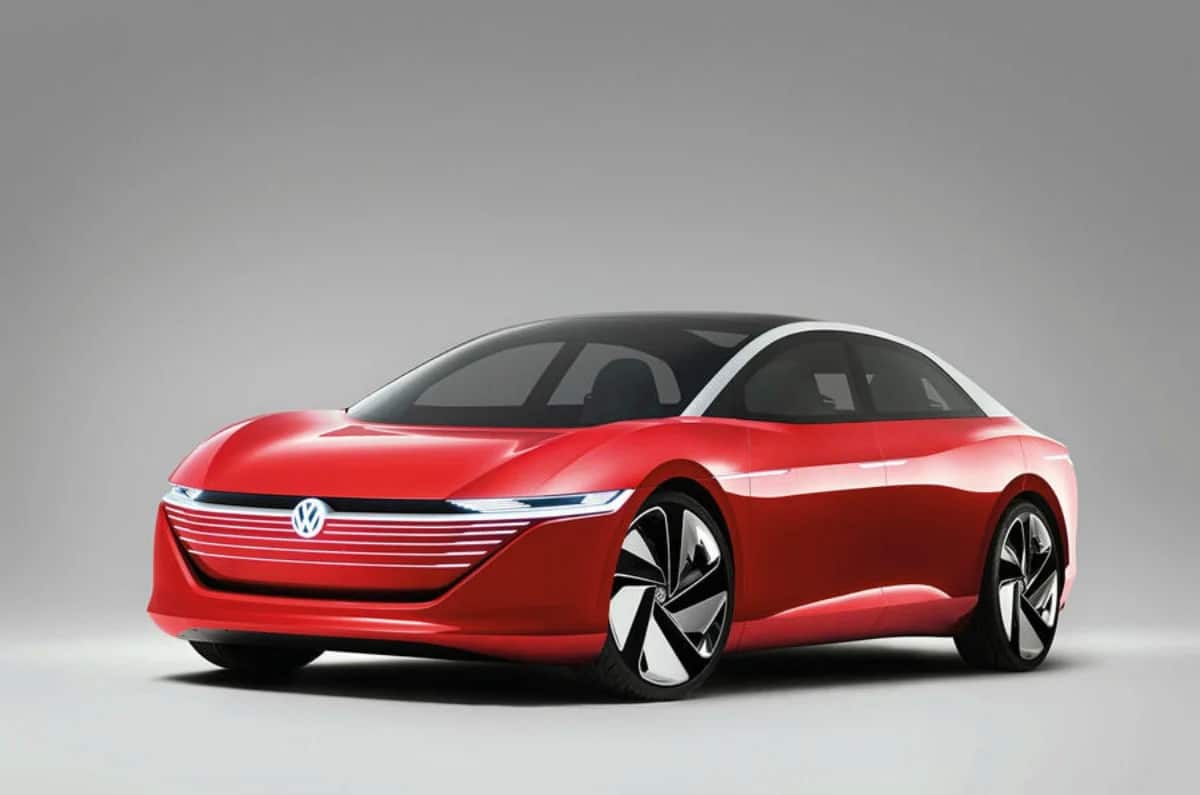[vc_row njt-role=”people-in-the-roles” njt-role-user-roles=”administrator,editor,author,armember”][vc_column][vc_column_text]
The German brand Volkswagen has announced that it will invest 180 billion euros over the next five years to increase its production of electric vehicles. The manufacturer is looking to catch up with electric car giant Tesla and the Chinese, who have a large market. After weak results in the last quarter of 2022, Volkswagen has every intention of rebounding.
Volkswagen is speeding up in electric. The German automaker said Tuesday that it plans to invest 180 billion euros ($193 billion) over five years in battery production and raw material supply. The investment is part of a strategy adopted by many automakers to reduce the costs of electric vehicles and protect their market share
The company announced Tuesday that more than two-thirds of its five-year capital budget will be allocated to electrification and digitalization, with up to $15 billion spent on batteries and raw materials. However, after the collapse of Silicon Valley Bank, the markets are somewhat shaken up and CFO Arno Antlitz informed analysts that the company may delay some battery investments.
At the end of the five years, Antlitz hopes the company would then have secured enough raw material supply agreements and increased battery production to reduce electric vehicle expenses, 40 percent of which come from battery costs.
“We plan to reach 20 percent electromobility in new sales starting in 2025, and we are already investing two-thirds of our budget in this area”, he said.
Catching up with Tesla and the Chinese
Volkswagen, as Europe’s largest automaker, is working to close the gap on electric vehicle pioneer Tesla by increasing its share of the growing market for battery-powered cars. The German brand aims to bring affordable electric vehicles – costing about 25,000 euros ($26,795) – to market by 2025. This vehicle would be produced on a second-generation version of its all-electric MEB platform. To achieve these goals, the automaker also announced the construction of its first North American plant in Canada, which is expected to go into production in 2027.
Volkswagen also intends to focus its investments on increasing its sales in China, which is traditionally its most important market. However, the German group is finding it difficult to establish itself in this country due to competition from local manufacturers. During his visit to China last month, Olivier Blume, CEO of the group since September 2022, said he was impressed by the development of the electric vehicle market. The group makes about 40% of its sales in China, mainly with traditional engines. In China, for example, it achieved a 16 percent market share in the automotive sector last year.
“We are very strong in internal combustion engines, but we are still behind in electric vehicles”, Blume said.
Production on the rise
Volkswagen shares were down 2.6% around 11 a.m. Tuesday, with Jefferies analysts calling the detailed fourth-quarter results “weak.” In 2022, Volkswagen met analysts’ expectations on revenue, but missed the consensus estimate for earnings before interest and taxes by 3%. Oliver Blume has therefore drawn up a 10-point plan to achieve the investment targets.
The automaker also said it was finalizing high-performance software for its premium and luxury brands. The latter could in the medium term be applied to the entire company, with the aim of improving the operations of its Cariad software unit. Created by former CEO Herbert Diess, Cariad has not met its targets, resulting in an operating loss of €2.1 billion in 2022 on sales of €800 million, according to the carmaker’s annual report.
This month, the automaker released an optimistic outlook for the coming year, which sent shares soaring. Volkswagen expects revenues to rise by 10 percent to 15 percent thanks to a 14 percent increase in deliveries.
Read also >Road to 20 : Porsche to further optimize profitability
Featured photo : © Volkswagen [/vc_column_text][/vc_column][/vc_row][vc_row njt-role=”not-logged-in”][vc_column][vc_column_text]
The German brand Volkswagen has announced that it will invest 180 billion euros over the next five years to increase its production of electric vehicles. The manufacturer is looking to catch up with electric car giant Tesla and the Chinese, who have a large market. After weak results in the last quarter of 2022, Volkswagen has every intention of rebounding.
Volkswagen is speeding up in electric. The German automaker said Tuesday that it plans to invest 180 billion euros ($193 billion) over five years in battery production and raw material supply. The investment is part of a strategy adopted by many automakers to reduce the costs of electric vehicles and protect their market share
The company announced Tuesday that more than two-thirds of its five-year capital budget will be allocated to electrification and digitalization, with up to $15 billion spent on batteries and raw materials. However, after the collapse of Silicon Valley Bank, the markets are somewhat shaken up and CFO Arno Antlitz informed analysts that the company may delay some battery investments.
At the end of the five years, Antlitz hopes the company would then have secured enough raw material supply agreements and increased battery production to reduce electric vehicle expenses, 40 percent of which come from battery costs.
“We plan to reach 20 percent electromobility in new sales starting in 2025, and we are already investing two-thirds of our budget in this area”, he said.
Catching up with Tesla and the Chinese
[…][/vc_column_text][vc_cta h2=”This article is reserved for subscribers.” h2_font_container=”tag:h2|font_size:16|text_align:left” h2_use_theme_fonts=”yes” h4=”Subscribe now !” h4_font_container=”tag:h2|font_size:32|text_align:left|line_height:bas” h4_use_theme_fonts=”yes” txt_align=”center” color=”black” add_button=”right” btn_title=”I SUBSCRIBE !” btn_color=”danger” btn_size=”lg” btn_align=”center” use_custom_fonts_h2=”true” use_custom_fonts_h4=”true” btn_button_block=”true” btn_custom_onclick=”true” btn_link=”url:https%3A%2F%2Fluxus-plus.com%2Fen%2Fsubscriptions-and-newsletter-special-offer-valid-until-september-30-2020-2-2%2F”]Get unlimited access to all articles and live a new reading experience, preview contents, exclusive newsletters…
Already have an account ? Please log in.[/vc_cta][vc_column_text]Featured photo : © Volkswagen[/vc_column_text][/vc_column][/vc_row][vc_row njt-role=”people-in-the-roles” njt-role-user-roles=”subscriber,customer”][vc_column][vc_column_text]
The German brand Volkswagen has announced that it will invest 180 billion euros over the next five years to increase its production of electric vehicles. The manufacturer is looking to catch up with electric car giant Tesla and the Chinese, who have a large market. After weak results in the last quarter of 2022, Volkswagen has every intention of rebounding.
Volkswagen is speeding up in electric. The German automaker said Tuesday that it plans to invest 180 billion euros ($193 billion) over five years in battery production and raw material supply. The investment is part of a strategy adopted by many automakers to reduce the costs of electric vehicles and protect their market share
The company announced Tuesday that more than two-thirds of its five-year capital budget will be allocated to electrification and digitalization, with up to $15 billion spent on batteries and raw materials. However, after the collapse of Silicon Valley Bank, the markets are somewhat shaken up and CFO Arno Antlitz informed analysts that the company may delay some battery investments.
At the end of the five years, Antlitz hopes the company would then have secured enough raw material supply agreements and increased battery production to reduce electric vehicle expenses, 40 percent of which come from battery costs.
“We plan to reach 20 percent electromobility in new sales starting in 2025, and we are already investing two-thirds of our budget in this area”, he said.
Catching up with Tesla and the Chinese
[…][/vc_column_text][vc_cta h2=”This article is reserved for subscribers.” h2_font_container=”tag:h2|font_size:16|text_align:left” h2_use_theme_fonts=”yes” h4=”Subscribe now !” h4_font_container=”tag:h2|font_size:32|text_align:left|line_height:bas” h4_use_theme_fonts=”yes” txt_align=”center” color=”black” add_button=”right” btn_title=”I SUBSCRIBE !” btn_color=”danger” btn_size=”lg” btn_align=”center” use_custom_fonts_h2=”true” use_custom_fonts_h4=”true” btn_button_block=”true” btn_custom_onclick=”true” btn_link=”url:https%3A%2F%2Fluxus-plus.com%2Fen%2Fsubscriptions-and-newsletter-special-offer-valid-until-september-30-2020-2-2%2F”]Get unlimited access to all articles and live a new reading experience, preview contents, exclusive newsletters…
Already have an account ? Please log in.[/vc_cta][vc_column_text]Featured photo : © Volkswagen[/vc_column_text][/vc_column][/vc_row][vc_row njt-role=”people-in-the-roles” njt-role-user-roles=”subscriber,customer”][vc_column][vc_column_text]








